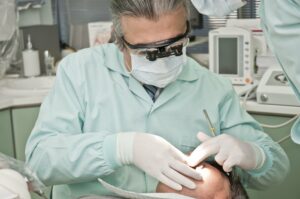By Peg Lopata, Contributing Writer

CAMBRIDGE – Inside your mouth is a little universe: a microbiome, as scientists call it. If all’s going well, the species of bacteria that live inside your mouth are living in harmony―especially if you floss and brush.
However, problems can arise when plaque―colonies of bacteria―build up on our teeth and gums. Too much plaque can create serious problems for our teeth, gums and even the bones in our jaws. But even more unfortunately, the problem can spread and cause other illnesses.
“It seems that something as benign as not removing plaque from your teeth can have severe consequences over time in susceptible people,” said Dr. Thomas Van Dyke, vice president for clinical and translational research at the Forsyth Institute and professor of oral medicine, infection and immunity at Harvard University in Cambridge.
From local to all over

Photo/Matthew Modoono for Forsyth Institute
Van Dyke is part of a group of scientists working on understanding why oral diseases cause problems well outside the oral cavity―in other words, why does local inflammation cause systemic―throughout the body―inflammation? From the teeth and gums to other organs, systems and even our bones, seems like a big jump, but when inflammation happens in the mouth, it can go to other places in the body.
“Chronic inflammatory disease like periodontitis is not just local. It is now well known that local inflammation causes systemic inflammation,” said Van Dyke. “Having untreated periodontal disease can make the most common diseases of aging―cardiovascular diseases, type 2 diabetes and arthritis―worse. Severe periodontitis has been associated not only with these diseases, but also premature low birth-weight babies and Alzheimer’s disease.”
Scientists now also know that some diseases elsewhere in the body can affect diseases of the mouth. Type 2 diabetes is such a disease.
“People with periodontitis are more likely to get type 2 diabetes if they have other risk factors and people with type 2 diabetes have more severe periodontal disease,” explained Van Dyke.
How does it happen?
Van Dyke explained that tooth decay can lead to infections of the center part of a tooth―the pulp, which is made up of tissue, blood vessels, and cells. This decay can cause systemic infections. It can even cause sepsis, which is when bacteria infect the bloodstream―a very dangerous condition.
Some mysteries remain
Researchers looking into this problem don’t have all the answers yet. But they do understand the key to treatment is preventing excess inflammation. The research focuses on how to do this on the molecular level.
One area of exploration for researchers in this field is the question of why some people develop oral chronic inflammation and others don’t.
“Not everyone is equally affected by not removing plaque,” Van Dyke admitted. “But we still don’t know how to predict who will be or won’t be affected.”
Another area most puzzling is that the removal of plaque doesn’t stop the inflammation for some people―the inflammation becomes chronic.
“This is an area of intense investigation,” said Van Dyke.
Scientists have learned more about the inflammatory process since a major discovery was made in the 1990s about how inflammation is controlled naturally by our bodies. More recent discoveries could lead to a solution for chronic periodontitis. But in the meantime, don’t let up on the flossing and brushing.
“I think the take-home message is that the link between oral and whole-body health is very real,” Van Dyke affirmed, “and that people should pay attention to their oral care.”
RELATED CONTENT:
Family Dental Group keeps you smiling with cosmetic dentistry services (fiftyplusadvocate.com)
Improve your brain health with meditation (fiftyplusadvocate.com)
Regular exams are a key step in maintaining eye health (fiftyplusadvocate.com)












